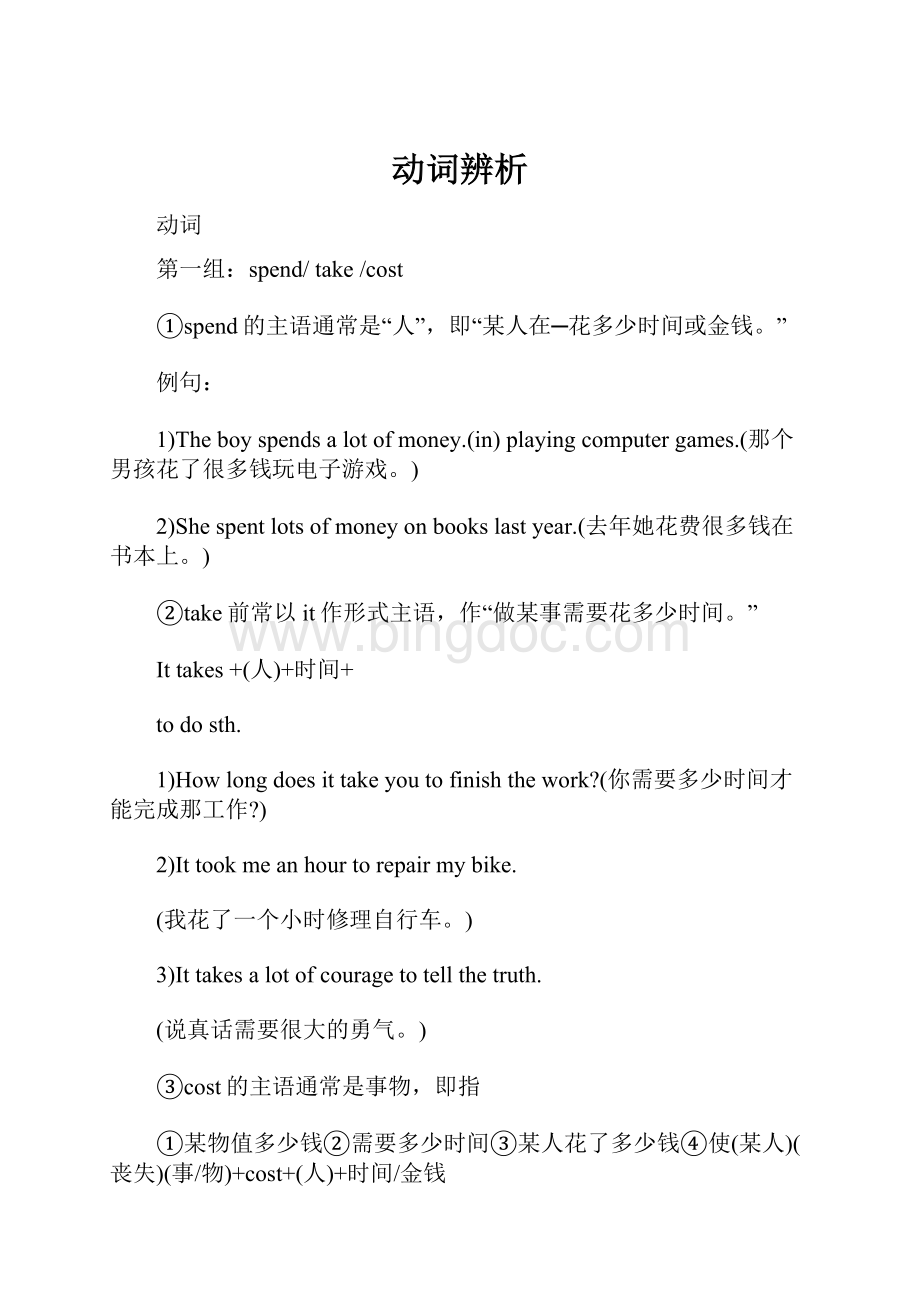动词辨析.docx
《动词辨析.docx》由会员分享,可在线阅读,更多相关《动词辨析.docx(20页珍藏版)》请在冰点文库上搜索。

动词辨析
动词
第一组:
spend/take/cost
①spend的主语通常是“人”,即“某人在─花多少时间或金钱。
”
例句:
1)Theboyspendsalotofmoney.(in)playingcomputergames.(那个男孩花了很多钱玩电子游戏。
)
2)Shespentlotsofmoneyonbookslastyear.(去年她花费很多钱在书本上。
)
②take前常以it作形式主语,作“做某事需要花多少时间。
”
Ittakes+(人)+时间+
todosth.
1)Howlongdoesittakeyoutofinishthework?
(你需要多少时间才能完成那工作?
)
2)Ittookmeanhourtorepairmybike.
(我花了一个小时修理自行车。
)
3)Ittakesalotofcouragetotellthetruth.
(说真话需要很大的勇气。
)
③cost的主语通常是事物,即指
①某物值多少钱②需要多少时间③某人花了多少钱④使(某人)(丧失)(事/物)+cost+(人)+时间/金钱
1)Thewatchcostmetwohundredyuan.
(这块手表花了我200块钱。
)
2)Writinganovelcostplentyoftime.
(写本小说要花很多时间。
)
3)Thegirl'sbadbehaviorcostherparentsmanysleeplessnights.
(那个女孩的不良行为使得她的父母许多夜晚睡不着。
)
注意:
cost的过去式,过去分词都是cost。
第二组:
speak/say/tell/talk
①speak说某种语言,说某人好、坏话是及物动词;发表讲话,对某人说话,是不及物动词。
1)ThestudentsspeakEnglishveryfluently.(这些学生英语说得非常流利。
)
2)ThePrimeMinisterspokeontheinternationalsituation.(首相就国际形势发表了演说。
)
3)Shealwaysspeaksillofothers.(她总是说别人的坏话。
)
②speak的习惯用语:
Generallyspeaking一般而言
Franklyspeaking坦白地说
Strictlyspeaking严格地说
nottospeakof且不说;更不用说
1)Generallyspeaking,manisstrongerthanwoman.(一般而言,男人比女人强壮。
)
2)WecanspeakEnglish,nottospeakofChinese.(我们会读英语,汉语更不用说了。
)
③①tell说谎;讲故事;说实话
1)Don'ttellalie.(不要说谎。
)
2)Shelikestotellstories.(她喜欢讲故事。
)
3)Weshouldalwaystellthetruth.(我们应该永远说实话。
)
③②tell辨别;叫某人做某事;接“间接”与“直接”宾语;tell+宾语+that从句
1)Sometimeswecan'ttellrightfromwrong.(有时我们无法辨别是非。
)
④talk连续地说话;习惯用法
1)Whatarethegirlstalkingabout?
(那些女孩们讲什么?
)
2)Youngpeopleliketotalkpolitics.(年青人喜欢谈论政治。
)
3)Italkedoverthematterwithher.(我与她谈论了那个问题。
)
④say说出某句话或某件事;后接从句,(但say与从句之间不能直接接人称代词或名词);说明时间;书信、布告报纸上的“说”,习惯用法
1)Shesaid,“Iloveyou.”(她说:
“我爱你。
”)
2)Saygoodbyetothem.(跟他们说再见。
)
3)Shesayssheisbusy.(她说她很忙。
)
4)Mywatchsays10:
00sharp.(我的表是十点整。
)
5)ThepapersaysthattherewasabigfireinShanghai.(报上说上海发生了一场大火)。
6)Itissaidthatshehasbeenawayforamonth.(据说她已走了一个月了)
7)Itgoeswithoutsayingthateducationisimportant.(不用说,教育是重要的。
)
8)Tomisagoodstudent,thatistosay,hegetsgoodgradesinschool.(Tom是个好学生,也就是说,他在学校的成绩很好。
)
第三组:
take/bring/carry/fetch
①take作“带去”“拿去”解;从近处把东西送到远处
例句:
1)She'lltakeherchildrentothepark.(她要带孩子去公园。
)
2)It'sraining,you'dbettertakeanumbrellawithyou.(下雨了;你最好把雨伞带上。
)
②bring“拿来;带来”;从远处把东西拿到近外
1)Bringthedictionarytome.(把字典拿给我。
)
2)Pleasebringyourreportwithyouwhenyoucometomorrow.(明天你来的时候,请把你的报告带来。
)
③carry作“携带,带去;搬运”解
1)Shealwayscarriesaredhandbag.(她总是带一个红色手包。
)
2)PleasecarrythisTVsetupstairs.(请把这台电视搬到楼上去。
)
④fetch作“去…取来,拿来;叫某人来”解
1)Thefootballisoverthere.Fetchitplease.(足球在那边呢,请把它拿回来。
)
2)Fetchthepoliceatonce.We'vefoundtherobber.(马上去叫警察来,我们已经发现那个抢劫的人。
)
第四组:
wear/puton/dress
①wear穿着,戴;留,表示“状态”是及物动词需加宾语
例句:
1)Shealwayswearsapairofglasses.(她总是戴着一副眼镜。
)
2)Hewearsablackjackettoday.(今天他穿着一件黑色的夹克。
)
②puton穿上,戴上,表示“动作”
例句:
1)Theteacherputonhishatandwentoutoftheoffice.(老师戴上帽子然后走出办公室。
)
2)Putonthegloves.It'scoldoutside.(戴上手套外面很凉。
)
③dress作“穿着…的衣服”解;给某人穿衣服不用写衣服
例句:
1)Sheisdressedinred.(她穿着红衣服。
)
2)Themotherdressesthechildeveryday.(那位母亲每天给孩子穿衣服。
)此句不能加衣服。
3)Shedressesherselfinred.(此句等于第一个例句。
)
第五组:
do/make
①do“做”主要是用来表示“行动”“行为”,如doomelets是“把蛋卷煎好”。
在do后面常加一些抽象名词,如dowrong(犯错)。
“wrong”是抽象名词常与do搭配的短语有:
①doone's
②do(the)some
③dosb.afavor帮人忙
④dowith利用;忍受;需要
⑤doawaywith废除
⑥dowithout用不着;不需要
⑦have
⑧dosb.
⑨donothingbutdo除了做…以外什么也没做
⑩dobusiness做生意
例句:
1)I'lldothedishestoday.
(今天我来洗盘子。
)
2)I'vedonemyhomework.
(我已经做完了作业。
)
3)Cryingdoesharmtoyou.
(哭对你没有益处。
)
4)Willyoudomeafavor?
(能否帮我一个忙?
)
5)Wecannotdowithoutatelephoneinourbusiness.(我们做生意没有电话是不行的。
)
6)Thenewteacherdidn'tknowwhattodowiththeclass.(新老师不知道如何对待他班上的学生。
)
7)IdidnothingbutwatchTVlastnight.(昨晚我除了看电视以外什么也没有做。
)
8)Whodoesyourhair?
(平常是谁给你做头发的?
)
②make“作”,表示“制造”,其后的宾语是make的产品。
如makeclothes制做衣服;make后常跟一些可数名词常与make动词搭配的短语有:
①makea
②makean
③make
④make
例句:
1)TheyhavemakegreatprogressinlearningEnglish.(在学习英语方面他们已经取得了很大的进步。
)
2)Whoisgoingtomakeaspeechtoday?
(今天谁来演说?
)
3)Don'tmakeanoise.嘘!
(不要出声。
)
4)Shemakesherlivingasateacher.(她作教师来维持生计。
)
第六组:
lie/lay/lie
1)lie不及物动词,躺;位于
lie—lay—lain—lying
例句:
①ShanghailiestothesouthofBeijing.(上海位于北京的南方。
)
②Shehaslaininbedforthreedays.(她已经在床上躺了三天了。
)
2)lay及物动词,放置;下蛋
lay—laid—laid—laying
例句:
①Thesehenslayeggseveryday.(这些鸡每天下蛋。
)
②Helaidhishandonmyshoulder.(他把手放在我的肩上。
)
③lie不及物动词,说谎
lie—lied—lied—lying
例句:
①Don’tlietome.(别骗我。
)
②Sheliesabouthercareer.(她编造她的经历。
)
第七组:
hear/listento
①hear听;是一种“自然无意的动作。
”hearof听说过hearfrom得到消息
例句:
Thedeafcannothear.
(聋子听不见。
)
②listen是一种“有意的动作。
”如后面有宾语则需加to;如没有宾语,listen后不可加to。
例句:
①Listen,somebodyiscrying.(听,有人在哭。
)
②Ilistenedbutheardnothing.(我注意听了,但没听见什么。
)
③Listentome.(听我说。
)
第八组:
sit/set/seat
①sit不及物动;坐;就座;
sit—sat—sat—sitting
例句:
①Hesatatthetablewritingaletter.(他坐在书桌旁写信。
)
②Sithereuntilshecomesback.(坐在这里等她回来。
)
③set安置;下沉;点燃;出考题;定时;树立(榜样)
set—set—set—setting
例句:
①Tom,setthetablefordinner.(Tom,摆好桌子准备吃饭。
)
②Hesetthealarmfor6:
00inthemorning.(他把闹钟定在早晨6点钟。
)
③Myteachersetverydifficultquestionsfortheexam.(我们老师试题出得非常难。
)
④Thesunrisesintheeastandsetsinthewest.(太阳从东方升起从西方落下。
)
③seat使坐;容纳
seat—seated—seated—seating
例句:
①)Thetheatercanseatatleast2000people.(这家戏院至少能容纳2000人。
)
②Pleasebeseated.(请坐下。
)此句等于Sitdownplease.
③Heseatedhimselfnexttoher.(他坐在她的旁边。
)
第九组:
rise/raise/arise/arouse/rouse
1)rise(太阳、月亮)升起,起来;(物价)上涨;(水)高涨
rise—rose—risen—rising
例句:
①Everyoneknowsthatthesunrisesintheeast.
(每人都知道太阳是从东方升起。
)
②Priceshaverisenquickly.
(物价快速上涨了。
)
③Sherosetoherfeet.
(她站了起来。
)
2)raise举起;养育;募款
raise—raised—raised—raising
例句:
①Raiseyourhandplease.(请你把手举起来。
)
②Thefarmerraisesalotofsheeponhisfarm.(这位农民在农场养了许多绵羊。
)
③Theyareraisingfoundsfortheexpedition.(他们正在筹募探险的基金。
)
④arise(问题、困难)发生、产生、出现;起(风、雾)
arise—arose—arisen—arising
例句:
①Astrongwindarosethismorning.(今天早上刮起强风。
)
②Adifferentproblemhasarisen.(不同的问题发生了。
)
③Amistarosefromthelake.(湖上起雾了。
)
④arouse通常表示比喻或情绪方面的“激发”
arouse─aroused─aroused─arousing
例句:
①ThebookarousedmyinterestinlearningEnglish.(这本书引起我对学习英语感兴趣。
)
②Thespeakerarousedtheangeroftheaudience.(演讲者激起了听众的怒气。
)
③rouse通常表示比较具体的“叫醒”或“唤醒”
rouse─roused─roused─rousing
例句:
①Thesoundrousedhimfromreflection.(声音使他从深思中惊醒。
)
②Theliesheheardabouthisfriendrousedhisanger.(听到有人对他朋友造谣,使他怒火中烧。
)
第十组:
lend/借出borrow
1)lend+人+物=lend+物+to+人
例如:
①Pleaselendmeyourdictionary.=Pleaselendyourdictionarytome.(请把你的字典借给我。
)
②Iwilllendyou$200,butIcan’tlendmoneytohim.(我借给你200美元,但我不能借钱给他。
)
borrow借入
borrow+物+from+人
①Shehasborrowedalotofbooksfromtheschoollibrary.(她已从学校的图书馆借了很多书。
)
②Heoftenborrowsmoneyfromme.(他经常从我这儿借钱。
)
第十一组:
fall/feel/fell/fail/
fall─fell─fallen落下;跌倒
fallasleep睡着/fallbehind落后
例句:
①Anapplefelltotheground.(一个苹果落在地上。
)
②Becarefulontheiceoryouwillfall.(在冰上要小心,否则你会跌倒。
)
feel─felt─felt
feellike+doingsth.想要;
feelsleepy.想睡
例句:
①Canyoufeelyourheartbeatviolently?
(你能感觉到你的心在猛烈地跳动吗?
)
②Bothmylegsdidn’tfeel.(我的双腿没有感觉。
)
③Isuddenlyfeltapaininmyback.(我突然感到背部疼痛。
)
④Doyoufeelliketakingawalk?
(你想不想去散步?
)
fell─felled─felled砍伐
例句:
Alotoftreeswerefelledlastnight.(昨晚很多树被人伐倒了。
)
fail─failed─failed失败
例句:
HehasfailedinEnglishexamagain.(他英语考试又没及格。
)
第十二组:
win/beat
win─won─won
winaprize得到奖品winawar打了胜仗
winagame赢得比赛winanelection选举获胜
例句:
①Ourteamwonthesame3to2lastnight.(昨晚我们队以3比2赢了比赛。
)
②Whodoyouthinkwillwinthebeautycontest?
(你认为那场选美谁会获胜?
)
③beat─beat─beaten
beat是打败了对手
例句:
①Hebeatmeintherace.(他在赛跑中赢了我。
)
②Wehavebeatentheirteamfor3years.(我们已连续3年打败他们的球队。
)
③Myheartbeatfastatthesightofher.(一看见她,我的心跳就加快。
)
第十三组:
cure/recover/restore/heal
1)cure——cured——cured治疗(疾病)
物+cure+人+of+病=人+becuredof+病
例句:
①Thismedicinewillcureyourheadache.(这种药会治好你的头痛病。
)
②Thedoctorcuredherofacold.(医生医好了她的感冒。
)
③Shewascuredofherdisease.(她的痛被治好了。
)
2)recover——recovered——recovered
恢复(健康);痊愈;复元与from连用
例句:
①Afterafewdays'rest,shehasrecoveredherhealth.(休息几天后,她已恢复健康。
)
②Theyhaven'trecoveredfromtheshockyet.(他们还未从那次打击中恢复过来。
)
3)restore——restored——restored
使…恢复健康;修复;重建
例句:
①Thedoctorrestoredthegirltohealth.(医生恢复了那个女孩的健康。
)
=Thegirlwasrestoredtohealth.
②Theworkershavealreadyrestoredtheruinedtemple.(工人们已修复了这座毁坏的寺庙。
)
4)heal——healed——healed
主要指伤口的治愈;消除;平息。
例句:
①Hiswoundisnotyethealed.(他的伤口尚未痊愈。
)
②Timehealsallbrokenhearts.(时间可以消除一切忧伤。
)
第十四组:
reach/arrive/getto
1)reach——reached——reached
及物动词到达,不加to等分词。
例句:
TheywillreachShanghaitonight.(今晚他们将抵达上海。
)
2)arrive——arrived——arrived
不及物动词到达,加介词in(大地方)at小地方。
例句:
①I'llphoneyouwhenIarriveinNewYork.(我到纽约后会给你电话。
)
②Whattimewilltheyarriveattheairport?
(他们什么时候会到达机场?
)
3)get——go